Trump says resolving issues with Iran without Israeli military strikes "would be nice"
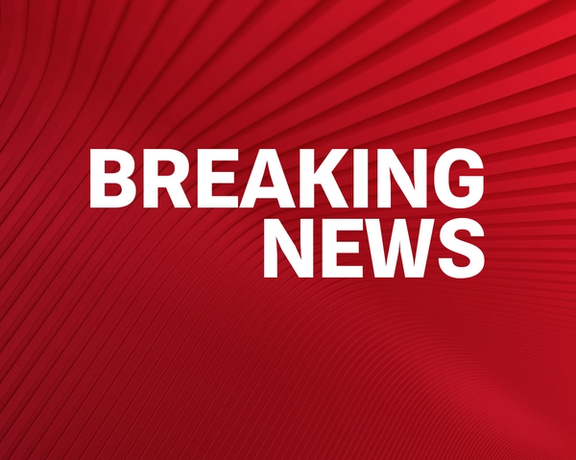

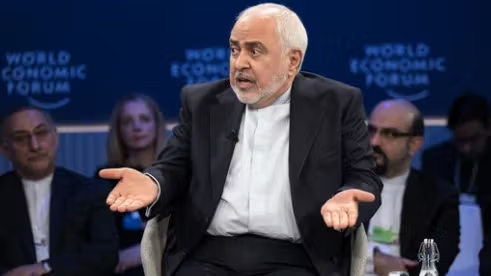
A senior Iranian official has demanded the immediate arrest of Mohammad Javad Zarif, strategic deputy to President Masoud Pezeshkian, over his remarks on the Islamic headscarf hijab made at the Davos Economic Forum.
“Anti-coup forces must arrest Zarif upon his return to the country and subject him to interrogation," the secretary of Tehran’s Promotion of Virtue and Prevention of Vice Council, Momeni-Nasab, wrote on X Thursday. "Otherwise, the country will soon face more complex and highly dangerous crises.”
The criticism arose after Zarif signaled a softer line on hijab enforcement in a CNN interview on the sidelines of the Davos Forum in Switzerland.
“The Islamic Republic has decided not to pressure women regarding the hijab,” Zarif said. “If you walk on the streets of Tehran, you will see some women without hijab. Although this is illegal, the government has chosen not to put women under pressure.”
Tehran’s Promotion of Virtue and Prevention of Vice Council is a governmental body tasked with enforcing Islamic behavioral codes, including mandatory hijab laws. It plays a significant role in shaping and implementing the Islamic Republic’s social policies.
In November 2024, the council announced plans to establish a "hijab clinic" aimed at providing "scientific and psychological treatment" for women who defy compulsory hijab regulations.
In addition to Momeni-Nasab, Zarif’s remarks on the hijab issue sparked backlash on social media, with critics accusing him of misrepresenting the Islamic Republic's stance.
Many argue that the enforcement of the new and more restrictive hijab law has merely been suspended temporarily and it could be revived at any time.
Ultra-hardliners have doubled down on their criticism of Zarif’s remarks. They emphasize Supreme Leader Khamenei’s clear stance on the hijab, citing an April 2023 speech in which he declared that flouting the hijab was both "religiously and politically haram (forbidden)."
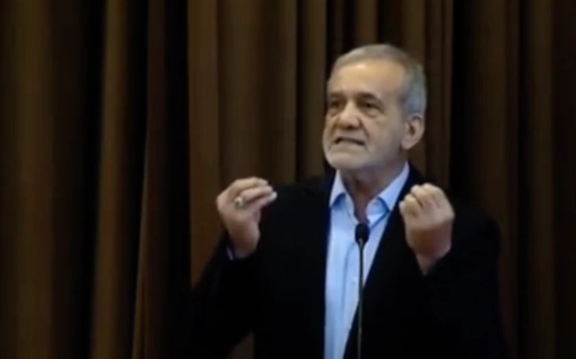
Iran’s President Masoud Pezeshkian on Thursday said the county's Supreme Leader Ali Khamenei has allowed engaging with all nations except Israel.
"The Supreme Leader has stated in his general policies that our approach should be based on dignity, expediency, and wisdom, and that we should maintain relations with everyone—except for Israel, which is a separate case as it is an aggressor," Pezeshkian said in a speech aired on state TV on Thursday.
He also pointed to China’s pragmatic approach to its relations with the US, appearing to suggest that Iran should take a similar path.
"Look at China with all its greatness. Despite the US calling it a threat and labeling it as its number one enemy in its books, China still practices tolerance. Why? Because it seeks to maximize its benefits in the world it lives in. We, on the other hand, cannot even tolerate ourselves, let alone our neighbors," he said.
Pezeshkian underscored the need for dialogue, saying that Iran must engage with the world through the language of peace, understanding, and integrity rather than "quarreling with everyone".
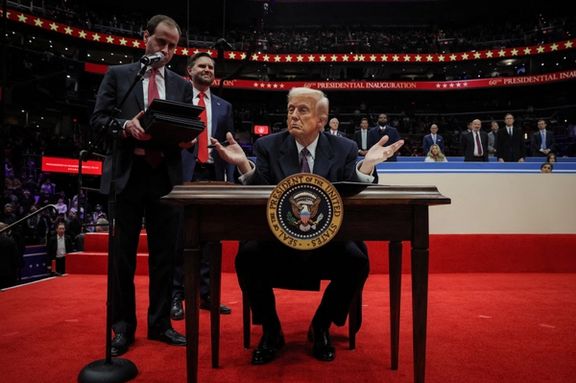
US President Donald Trump revoked security protection for former secretary of state Mike Pompeo and former special envoy for Iran Brian Hook despite warnings from the Biden administration about ongoing threats from Tehran, according to the New York Times.
Pompeo and Hook were key figures in Trump’s hardline policies toward Tehran during his previous term, including the 2020 drone strike that killed Iranian General Qassem Soleimani.
Citing four people with knowledge of the matter, the New York Times reported that intelligence assessments indicated Iranian threats to the lives Pompeo and Hook related to their deeds in office remain ongoing, which led the Biden administration to extend their security details during its term.
Earlier this month, the AP reported that Washington extended protection for Pompeo and Hook over threats from Iran.
Last month, the State Department informed Congress that the threats against Pompeo, former secretary of state, and Hook, former special envoy for Iran, are still “serious and credible”, which justify the renewal of their protection programs.
Citing one of the sources briefed on the matter, the report said that their State Department-funded security was withdrawn on Tuesday. A day earlier, Trump also terminated the Secret Service protection for John Bolton, his former national security adviser, who allegedly faces similar threats.
The report added that Biden administration officials had privately briefed the Trump administration about the ongoing threats to Pompeo, Hook, and Bolton.
“I am disappointed but not surprised that President Trump has decided to terminate the protection,” Bolton said in a statement on X on Tuesday, adding that Joe Biden had given the protection despite his criticism of Biden's policies.
“The Justice Department filed criminal charges against an Iranian Revolutionary Guard official in 2022 for attempting to hire a hitman to target me. That threat remains today,” Bolton added.
According to the US Justice Department, Shahram Poursafi, an Iranian operative, attempted to pay $300,000 to have Bolton killed in Washington DC or Maryland.
Bolton also confirmed to the New York Times that he was contacted by two government agencies last week and informed that the threat level had not changed.
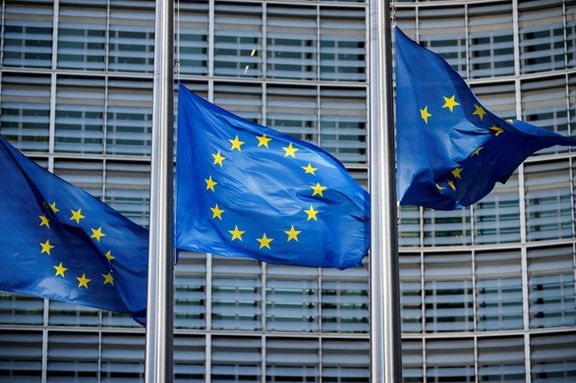
The European Parliament has adopted a motion for a resolution condemning Iran’s detention of European Union citizens, labelling the practice as “hostage diplomacy.”
The resolution, details of which were released on Wednesday, also highlights Iran’s broader human rights violations, calls for the immediate release of detained EU nationals and for a stronger coordinated diplomatic efforts by EU member states.
In its resolution, the European Parliament “strongly condemns Iran’s use of hostage diplomacy” and calls for the immediate and safe release of all EU citizens held in the country, including Olivier Grondeau, Cécile Kohler, Jacques Paris, and Ahmadreza Djalali.
The resolution also addresses the escalating use of the death penalty in Iran, particularly in cases involving activists and minorities, with Iran reaching record highs in excess of 900 last year.
The Parliament expressed its “strong condemnation of the death sentence against Pakhshan Azizi and Varishe Moradi” and demanded their “immediate and unconditional release.”
The motion also calls on the EU Council to take decisive action, including designating the Islamic Revolutionary Guard Corps (IRGC) as a terrorist organization and extending sanctions to individuals responsible for human rights abuses. It reaffirms the Parliament’s opposition to the death penalty and urges Iran to impose an immediate moratorium on its use.
In addition, the resolution reflects growing support for Iranian civil society and the ongoing “Woman, Life, Freedom” movement, underscoring the Parliament’s solidarity with the Iranian people.
“The European Parliament reiterates its full support for Iranian human rights defenders,” the text reads, urging Member States to provide greater financial and diplomatic backing to activists working under extreme pressure.
The resolution will be forwarded to EU institutions and Iranian authorities, including the Supreme Leader and the parliament, as part of ongoing efforts to address human rights concerns in the region.
The motion comes amid growing international scrutiny of Iran’s use of foreign and dual nationals as leverage in diplomatic negotiations.
Earlier this month, French citizen Olivier Grondeau, held in Iran for over two years on espionage charges, publicly revealed his identity and described his ordeal in a phone interview aired on French radio.
Rights groups and foreign governments have denounced such detentions as a form of “hostage diplomacy.”
Also this month, an Italian journalist was released from Iranian custody, reportedly as part of an effort to pressure Italy into freeing an Iranian detained on terrorism charges.
It is the latest in a series of cases spanning decades. Last year, a Swedish EU representative was released from Iran in exchange for the release of a former Iranian official in prison in Sweden on charges of crimes against humanity.

Iraq is prepared to mediate between the United States and Iran, but while Tehran has signaled openness to the proposal Washington has yet to do so, Iraqi Foreign Minister Fuad Hussein said on Thursday.
“Until now, I don't see any signal from Washington that they are ready to negotiate with the Iranian side while the Iranians are giving that signal,” Hussain told a panel at the World Economic Forum in Davos.
“We are rather worried about the tension and we hope that both sides will choose a different approach. And that's the approach of, once again, negotiating," he said, expressing his country's readiness to play a role.
“The tension between Washington and Tehran, it affects us directly, not indirectly,” Hussein said,
Iran's president Masoud Pezeshkian has conveyed Tehran's willingness to engage in talks with Washington but hardline factions have strongly criticized such gestures.
The remarks by Iraq's foreign minister follows reports suggesting Iran is actively seeking Iraqi mediation to facilitate talks with the United States, with which it has not had diplomatic ties since 1980.
An unnamed Iraqi political figure has been authorized to establish a special channel for discussions between Washington and Tehran, according to UAE-affiliated Erem News.
The presence of Iranian-backed Shia militias in Iraq is a key source of friction between Washington and Baghdad, despite the US describing its relationship with Iraq as a strategic partnership.
The outlet also said concerns are growing in Iraq about the potential repercussions of escalating tensions in the region between Iran, its military allies and Israel. With possible Israeli attacks on Iran, Iraq fears for its own security and stability, Erem News said.
The outlet added that Iranian political leaders representing Masoud Pezeshkian's government had informed Iraq of their readiness to engage in talks with the US. However, this idea continues to be rejected by Iran's Supreme Leader.
The proposal comes as Donald Trump was sworn in on Monday for his second, non-consecutive term as US President.
During his previous tenure, Trump introduced stringent measures to counter Tehran's influence, particularly targeting its nuclear program. The sanctions imposed by Washington during that time dealt a significant blow to the Iranian economy.